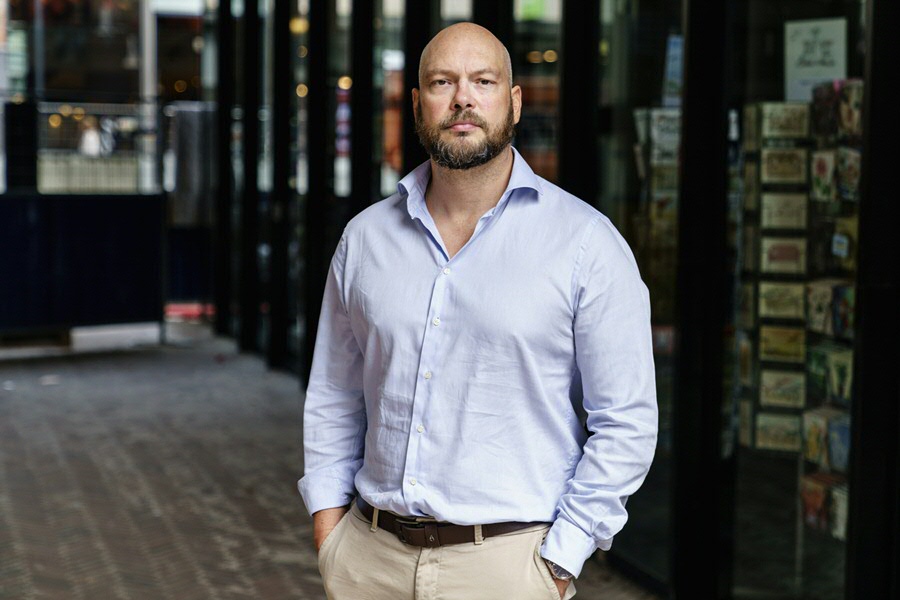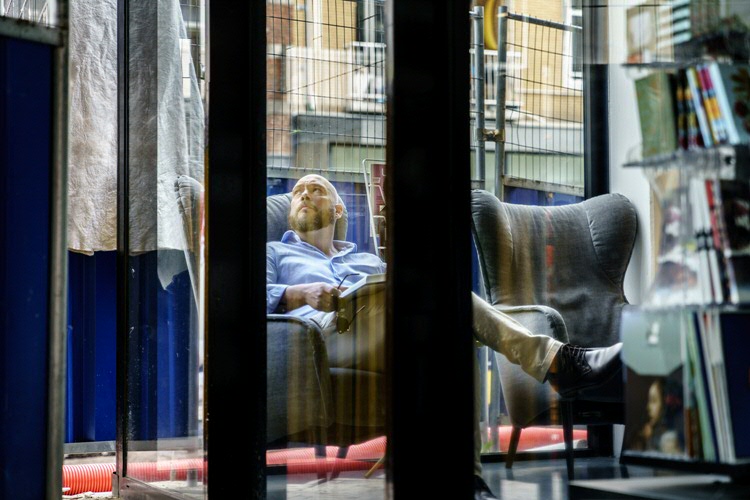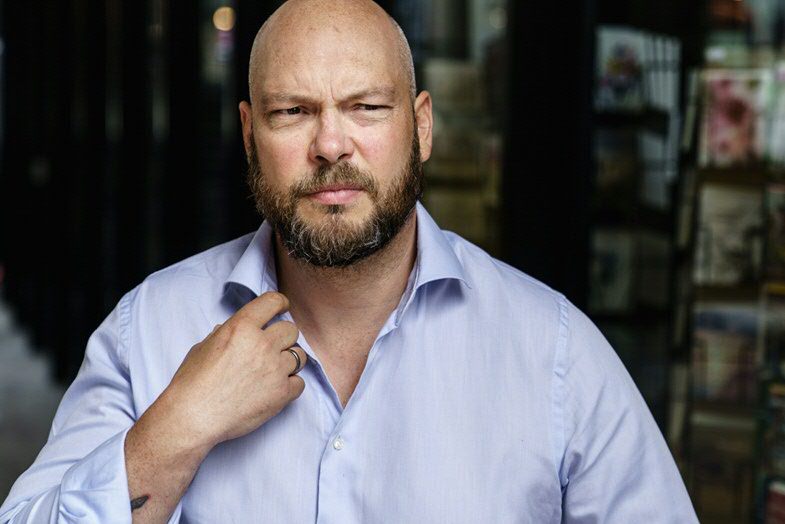The question prisoners are never asked: what books do you read?
Literature scholar Dr Konstantin Mierau talks to Chilean prisoners about literature. He asks them about the books they read, the characters they identify with, and the impact literature has on them. By doing so, he is exploring how literature can be used to reach prisoners and help them reintegrate into society. “I ask them questions that they never get asked.”
Text: Marjolein te Winkel | Photos: Reyer Boxem

Konstantin Mierau had his first conversation about literature with a prisoner in 2017, in a prison in La Nueva Imperial, a small town in southern Chile. Having spent the long bus ride to the remote town trying to think of the best question to open the conversation, he had forgotten it by the time he arrived. So he simply asked the young man sitting opposite him what he had done that day. Mierau: “He told me that his family had been to visit him and that his third child had just been born.” Mierau, who himself became a father at a young age, seized on the subject to get the conversation going.
Mierau has been travelling to Chile regularly for the past six years. He has since interviewed more than 50 prisoners. He often starts a conversation with a shared experience or interest to break the ice; working on cars, riding motorbikes, tattoos, children. After this short introduction and an explanation of his research, he asks his first question: What kind of stories did you like as a child?
Many of the inmates he has spoken to in recent years grew up in rural Chile. As young children, they listened to the radio and read books of popular children’s stories. As teenagers in the city, they watched TV in the pub and went to the cinema. It was not until they were in prison that most of them really began to read.
“When you're in prison, you have a lot of time every day to read and watch films and series,” says Mierau. “But people hardly ever talk to them about this. I ask questions that researchers never ask them. What was your favourite book as a child? Which characters do you identify with? But also, how much do you read? How often do you go to the prison library? Do you ever see other prisoners reading, and do you ever talk to them about it?”
He has noticed that prisoners get excited when he asks them about their favourite books. “Their eyes light up when they talk about certain characters and when they talk about how a particular book makes them feel.” Popular books include the series The Hunger Games, biographies of famous people, such as the one about Colombian drug lord Pablo Escobar. “Many of them are also interested in books about the Second World War. A lot of people read the Bible. And in women’s prisons, Michelle Obama’s books are very popular.”

What kind of impact does reading have on prisoners?
Each conversation produces ‘an autobiography of the consumption of fiction’. A life told in the stories people absorb, which inspire them, allow them to escape from reality and make them think. They provide insights that are largely absent from the academic debate. “We talk a lot about how we portray prisoners in fiction, and countless books have been written about the literary portrayal of prisoners. But we don’t actually know how reading affects prisoners themselves. Literary and cultural research is still largely conducted from the comfort of libraries,” says Mierau.
The discrepancy between the large volume of academic research on prison literature and the paucity of knowledge about the literary experiences of prisoners themselves inspires Mierau to continue his conversations. “It’s not easy to sit opposite someone who has brutally killed several people. You never get used to that. But I think academics have a duty to bring groups together. That’s what drives me. And to do that well, I have to be part of that conversation.”
Making a quick buck versus school and studying
Mierau grew up in Berlin in the 1980s, not far from the wall that turned the eastern side of the city, his side, into a kind of prison and the western part into a virtually impregnable fortress. Anyone who dared to defect to the West, and anyone who even dared to get too close to the Wall, risked their life. To escape this ‘rather oppressive’ environment, he read a lot –at home, during the holidays, at school. As he read, he travelled the world through stories and in his imagination. His grandfather often read to him from Cervantes’ The Ingenious Nobleman Don Quixote of La Mancha, instilling in him a love of Spanish-language literature. After the fall of the Berlin Wall, when Mierau was ten, the family moved to Groningen.
As a migrant from the former Eastern Bloc, he knows that the environment in which a person grows up can have a huge impact on the opportunities that come their way and the choices they make. “There are very clear differences between who gets opportunities and who doesn’t. Those differences persisted during my childhood between West and East Germany, but they also exist here in Groningen, even without a huge wall between them. It matters if you grow up in Lewenborg or in Haren.” Mierau also knows what it is like to grow up in an environment ‘where all kinds of forces are pulling at you’: ending up in trouble, getting kicked out of school and wondering: ‘Should I go for a quick buck, or choose the difficult path of school and studying?’
After a few detours, he decided to study, starting with a Bachelor’s degree in Spanish at the University of Groningen in 2003. After a Research Master, a PhD, and six years as an assistant professor, he became an associate professor of European Culture and Literature in 2021. Besides his research, he teaches students on the European Languages and Cultures Bachelor’s programme and is Programme Director of the Graduate School for the Humanities and Director of the Federation of Graduate Schools in the Social Sciences and Humanities.

Reading programmes in prisons
What is it that motivates some to choose school and studying, and others to turn to crime? And, most importantly, what can we do to bring these groups together, and what role can literature play in this? These questions are the catalyst behind Mierau’s research. Through the knowledge and insights he is gaining from talking to prisoners, he is learning how to use literature to reach people, and thereby use literature to develop social skills.
“We know that books in which a character goes through transformations are great for developing empathy and compassion. And that more empathy can reduce conflict. So by reading a story, by empathising with other people’s characters, you learn to reflect on your behaviour. But we also know that this only happens when people lose themselves in the text. The texts that you or I lose ourselves in may not be the same as those that people who have had a huge conflict with society lose themselves in. What works for them? You don’t know until you ask.”
Mierau intends to use the answers to this question to develop reading programmes that help prisoners reintegrate into society, with books that reach them and that they enjoy reading. “In the end, people pick up a book for enjoyment. It’s only by opening the book and starting to read that you discover what reading can do for you.”
In the near future, Mierau hopes to set up a research centre on cultural consumption in prisons, from which he can organize events and facilitate the exchange of knowledge. “My research straddles the boundary between cultural studies and sociology. So for a long time, it was caught between the two. Now, with all the pioneering knowledge I have gained over the past six years, I can connect the two disciplines and contribute to the academic debate about how texts actually affect readers from different backgrounds and in different situations.”
Pre-University AcademyMierau’s research approach inspired him to develop the ‘Lezen onder de Loep’ [Reading under the magnifying glass] teaching material, which is used in secondary schools in the Netherlands. In collaboration with the UG's Pre-University Academy, he has developed teaching materials for literary education in secondary schools. “The idea is that pupils interview each other about the characters in a book. What do they like about the story, what do they identify with? This leads to a conversation that goes beyond the story and the characters to explore how reading affects people. We know that people are reading less and less, especially young people, so it’s important that we help them to become culturally literate.” |
| Last modified: | 02 May 2024 1.04 p.m. |
More news
-
12 March 2025
Breaking news: local journalism is alive
Local journalism is alive, still plays an important role in our lives and definitely has a future. In fact, local journalism can play a more crucial role than ever in creating our sense of community. But for that to happen, journalists will have to...
-
11 March 2025
Student challenge: Starting Stories
The Challenge Starting Stories dares you to think about the beginning of recent novels for ten days.
-
11 March 2025
New: Sketch Engine, tool for language research
Sketch Engine is a tool for language research, which can also be used for text analysis or text mining.
